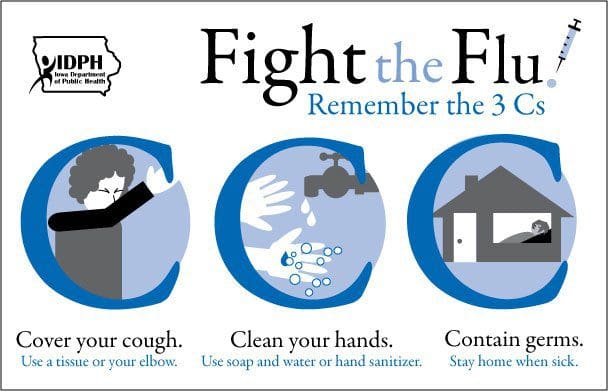Getting a flu vaccine is more important than ever this year to protect yourself, your family, and your community from flu. The CDC recommends everyone 6 months and older to get the flu vaccination each year. The more people who get it – the better protected we all are against serious complications caused by influenza. Receiving a flu vaccine can also help reduce and reserve resources used by our healthcare systems responding to the COVID-19 pandemic.
What is Influenza (Flu)?
Flu is a contagious respiratory illness caused by influenza viruses that infect the nose, throat, and sometimes the lungs. It can cause mild to severe illness, and at times can lead to death.
Flu Symptoms
Flu is different from a cold. Flu usually comes on suddenly. People who have flu often feel some or all of these symptoms:
- fever* or feeling feverish/chills
- cough
- sore throat
- runny or stuffy nose
- muscle or body aches
- headaches
- fatigue (tiredness)
- some people may have vomiting and diarrhea, though this is more common in children than adults.
*It’s important to note that not everyone with flu will have a fever.
How do I prevent the flu?

About the Vaccine
Getting a flu shot….
- Prevents millions of illnesses and flu-related doctor visits each year
- Can reduce the risk of flu-associated hospitalizations.
- Is an important preventative tool for all people, especially those with chronic health conditions, women who are pregnant, elderly, and young children
- Has been shown to reduce the severity of illness in people who get vaccinated but still get sick.
- Getting vaccinated may also protect people around you including those who are more vulnerable to serious illness, like babies and young children, older adults, and people living with chronic health conditions.
- The flu shot cannot give you the flu.
How the Vaccine Works
Misconceptions about the Vaccine
Can a flu vaccine give you flu?
No, flu vaccines cannot cause flu illness. Flu vaccines are made with either inactivated viruses, or with only a single protein from the virus. These do not cause you to get the flu.
Is it better to get sick with flu than to get a flu vaccine?
No. Flu can be a serious disease, especially among young children, elderly adults, those with chronic health conditions, and pregnant women. Any flu infection can carry a risk of serious complications, hospitalization or death, even among otherwise healthy children and adults. Getting vaccinated is a safer choice than risking illness to obtain immune protection.
Do I really need a flu vaccine each year?
Yes. A person’s immune protection from vaccination declines over time, so an annual vaccination is needed to get the best protection against the flu. The flu viruses are also constantly changing, so the vaccine is reviewed and updated each year, based on research of which influenza viruses are making people sick.
Can I still get sick with flu symptoms even if I receive the vaccine?
Although the flu vaccine cannot give you the flu, there are several reasons why someone might still get flu symptoms even though they have been vaccinated.
• Some people can become ill from other respiratory viruses besides the flu but can cause similar symptoms.
• Some may have been exposed to flu viruses shortly before getting vaccinated or during the two-week period after vaccination that it takes the body to develop immune protection
• Some may have been exposed to a flu virus that is very different from the viruses the vaccine is designed to protect against.
• How well the flu vaccine works can vary from season to season. The flu shot does reduce the risk of flu as well as serious symptoms caused by the flu.
*Information obtained from CDC, 2020
Learn more at cdc.gov/flu
